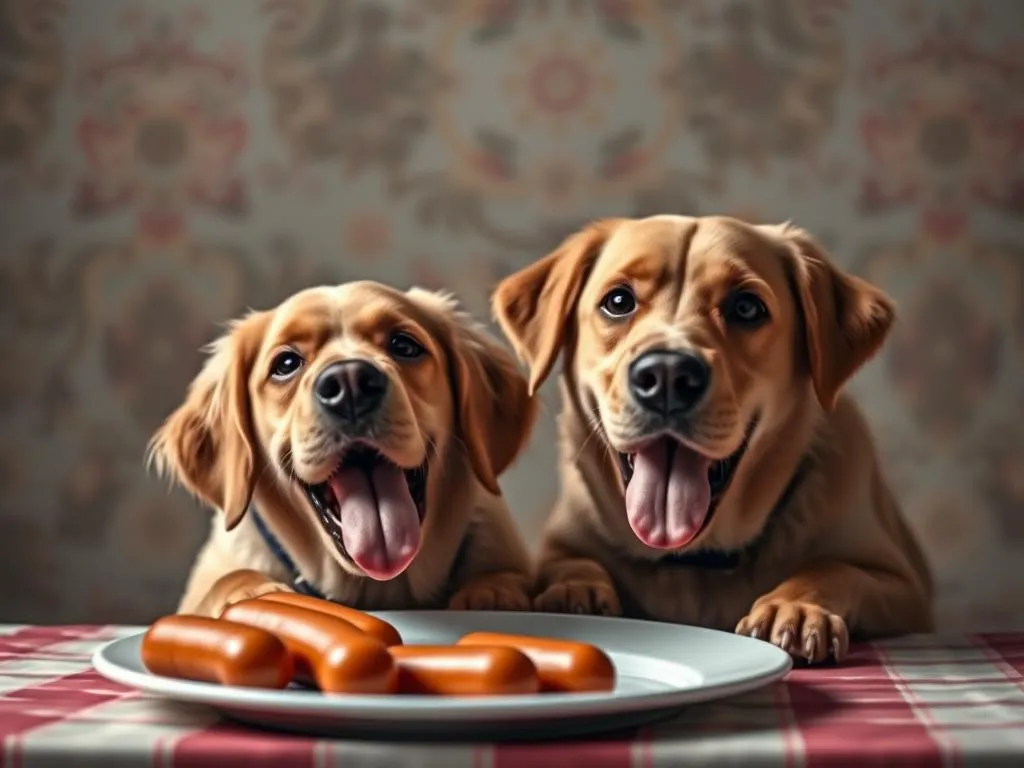
Understanding what our furry friends can and cannot eat is crucial for their health and well-being. Many pet owners often wonder about common human foods and their effects on dogs. One such food that frequently comes up in discussions is Vienna sausages. While they might seem like a tasty treat for dogs, it’s important to analyze their ingredients and understand the potential consequences of feeding them to our pets.
Understanding Dog Nutrition
Basic Nutritional Needs of Dogs
Dogs require a balanced diet to thrive, which includes essential nutrients such as proteins, fats, carbohydrates, vitamins, and minerals.
- Proteins: Vital for growth, maintenance, and repair of body tissues.
- Fats: Provide energy and support cell structure.
- Carbohydrates: Serve as a source of energy and aid in digestion.
- Vitamins and Minerals: Support various bodily functions, including immune health and bone strength.
A balanced diet ensures that dogs receive all the nutrients they need to maintain health, energy levels, and overall well-being.
Common Foods to Avoid
While some human foods can be safe or even beneficial for dogs, others can be toxic or harmful. Here are a few common foods to avoid:
- Chocolate: Contains theobromine, which is toxic to dogs.
- Grapes and Raisins: Can cause kidney failure.
- Onions and Garlic: May damage red blood cells.
- Xylitol: A sugar substitute that can lead to insulin release and liver failure.
Understanding why certain human foods pose risks is essential for keeping dogs safe and healthy.
Vienna Sausages – An Overview
What Are Vienna Sausages?
Vienna sausages are small, canned sausages that originated in Austria. They are typically made from a mixture of meats, such as pork, beef, or chicken, and are often flavored with spices and seasonings. These sausages are popular as a quick snack for humans, making them a common item in many households.
From a nutritional standpoint, they are generally low in calories but can be high in fat and sodium. A single Vienna sausage can contain around 40-50 calories, with a significant portion coming from fat.
Ingredients that May Be Concerning
When considering whether dogs can eat Vienna sausages, it’s essential to look at the ingredients that might be problematic:
- High Sodium Content: A typical Vienna sausage can contain about 300-400 mg of sodium. High sodium levels can lead to excessive thirst and urination in dogs and can even cause sodium ion poisoning in severe cases.
- Preservatives and Additives: Many Vienna sausages contain preservatives like sodium nitrite, which can be harmful over time.
- Potential Allergens: Some varieties may include gluten or soy, which can be problematic for dogs with allergies or sensitivities.
Can Dogs Eat Vienna Sausages?
Veterinary Opinions
The general consensus among veterinarians is that while Vienna sausages are not toxic to dogs, they are not recommended as a regular part of their diet. Feeding them occasionally in small amounts may be safe for some dogs, but there are several risks associated with regular feeding.
Potential Health Risks
Feeding your dog Vienna sausages regularly can lead to several health issues:
- High Sodium Effects: As mentioned, excessive sodium can lead to increased thirst and possible health complications, including hypertension.
- Obesity and Pancreatitis: The high-fat content can contribute to obesity in dogs, which can lead to other health problems, including pancreatitis, a painful condition that requires immediate veterinary attention.
- Allergic Reactions: Some dogs may experience gastrointestinal upset or allergic reactions from ingredients in Vienna sausages.
Signs of Adverse Reactions
If your dog consumes Vienna sausages, watch for the following symptoms:
- Vomiting or diarrhea
- Excessive thirst or urination
- Lethargy or unusual behavior
- Signs of an allergic reaction, such as itching or swelling
If any of these symptoms occur, consult your veterinarian immediately.
Alternatives to Vienna Sausages
Healthier Snack Options
Instead of reaching for Vienna sausages, consider these healthier, dog-friendly treats:
- Carrots: Low in calories and high in fiber, carrots are a great crunchy snack.
- Apple slices: Remove the seeds and core; apples are full of vitamins.
- Chicken bites: Cooked, plain chicken can be a delicious protein treat.
- Pumpkin Puree: Great for digestion and low in calories.
Additionally, you can make homemade treats to ensure they meet your dog’s nutritional needs.
How to Introduce New Foods to Dogs
When introducing new foods into your dog’s diet, follow these tips:
- Start Small: Introduce a tiny amount and observe how your dog reacts.
- Monitor for Allergies: Watch for any signs of allergies or gastrointestinal upset.
- Gradual Increase: If there are no adverse reactions, you can gradually increase the amount over time.
Conclusion
While it may be tempting to share your Vienna sausages with your dog, it’s crucial to consider the potential health risks associated with these snacks. Dogs thrive on a balanced diet tailored to their nutritional needs, and there are many healthier alternatives available. Always consult with your veterinarian before introducing new foods to ensure that your dog remains healthy and happy.
Frequently Asked Questions (FAQs)
Can small amounts of Vienna sausages be okay?
Yes, small amounts of Vienna sausages may not be harmful to most dogs. However, they should not be a regular part of their diet due to the high sodium and fat content.
What should I do if my dog eats Vienna sausages?
If your dog eats Vienna sausages, monitor them for any signs of adverse reactions, such as vomiting or lethargy. If you notice any concerning symptoms, contact your veterinarian for advice.
Are there any health benefits to feeding Vienna sausages?
While Vienna sausages are a source of protein, the health risks associated with their high sodium and fat content outweigh any potential benefits.
What are some signs that my dog is having a negative reaction to a new food?
Signs include vomiting, diarrhea, excessive itching, swelling, and unusual lethargy. If you observe any of these symptoms, consult your veterinarian.
Understanding the dietary needs of dogs is crucial for their health, and being informed about what foods are safe and beneficial can help you make better decisions for your furry friend.









